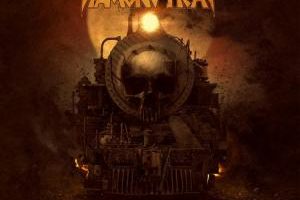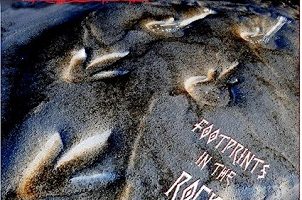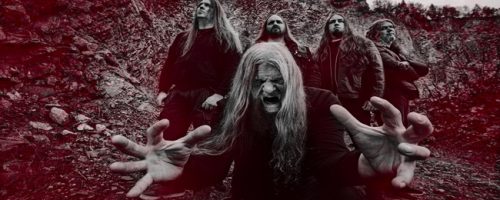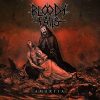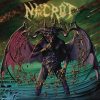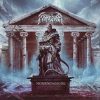Diamond Head – All Has Been Revealed
Sunday, 10th April 2016
DR didn’t bring this up to main Diamond Head man Brian Tatler, but it was on purpose that we didn’t ask any Metallica-related questions. Isn’t there more to the legendary British metallers than James, Lars, and co.? Absolutely. Then again, it seems like every time the fair and gentlemanly Tatler does an interview, someone has to lob a Metallica softball question. Tatler, of course, takes it in stride, but in this instance, the band has a new (and quite good) album to support, a sterling new frontman in Rasmus Bom Anderson, and, a career with several noticeable peaks and valleys. Other things to discuss indeed.
The band’s self-titled affair (set for a late April release via Dissonance Productions) is easily their best in decades. Once known for being one of the forerunners of epic song constructs, Tatler has pulled Diamond Head’s structural reigns in, emerging with a fresh batch of tunes that are edgy, melodic, and suitably catchy. And Anderson is the real kicker here, a smooth, gliding singer with plenty of range (see: “Bones”), but also the texture and feel of a guy who sounds like he’s been in Diamond Head for ages.
Above all else, the self-titled album appears to have galvanized Tatler, who was sure he would never release another album under the Diamond Head banner. Is it okay to say “never say never?” We think so. Here’s us gabbing away with Tatler, too…
Dead Rhetoric: A lot of classic metal bands are worried about the “nostalgia act” tag being thrust upon them. Even as you continue to release new material, is that something that is still on your mind?
Brian Tatler: I don’t think you can avoid it, really. Up until this new album, our set would pretty much would lean on the first album, which everyone wants to hear. Then we’d do a couple of tracks from Borrowed Time, maybe one track from Canterbury. You can’t help that. A lot of the songs feel old, and we were trying to revamp our set every now and again and add something we haven’t played in a while, or never played. Now it seems because it’s got such good reviews and people are asking to hear the songs, we’ll probably do a set that leans on Lightning to the Nations, but also the self-titled album.
Dead Rhetoric: Plus, a lot of these songs feel like they’d fit well with Lightning to the Nations.
Tatler: I think a lot of them will work well live. They sounded great in rehearsal. That was one of the plans—to write the record, rehearse it in a room without relying on a studio or a producer. Let’s make sure it sounds right in the room. We taped all of the rehearsals, so I’d sit at home with a pad and take notes of things just so we could get it right before we started recording. I don’t think we did that on the last couple of albums. It was Rasmus’s idea to get the band together in the room and it’s definitely paid off.
Dead Rhetoric: A lot of bands don’t do that anymore.
Tatler: We tried that on the last album, but our drummer Karl [Wilcox], did the drums in America in his garage. He played to a demo, so it was piecemeal. We never were in a room working on the songs. It was what it was. We did the best we could. This is a better way of working. You can capture things that you wouldn’t get just working on Pro Tools.
Dead Rhetoric: So what’s the approval process? Does everything have to go through you since you’re the main songwriter?
Tatler: I don’t do lyrics—that’s Ras. We haven’t done a new album in eight years, so I’ve been sitting on loads of material. When Ras joined and we had a conversation about writing, I said, “I’ve got stuff I can give you.” I ended up giving him 45 songs on CD. I said, “Take these, and listen to them and come back.” He would make notes and said, “This is good. This isn’t very good.” So we whittled it down to 14 songs we worked on in rehearsal, and that got whittled down to 11.
Dead Rhetoric: You were basically done doing new albums. So this self-titled album has to have been a pleasant surprise.
Tatler: I’m very impressed with what Ras has done. As soon as he did the guide vocals, I thought it was amazing. They were some of the best guide vocals I had ever heard. I knew it was going to be great.
Dead Rhetoric: Nick Tart is a great singer, but, can you describe the impact Ras has had on the band?
Tatler: We wanted to see what he was like live. He learned all of the Diamond Head material. He listened to everything…and probably taken an overview of our entire back catalog. He probably brought some of that with him into the record, like, “This is what makes Diamond Head good and I want to continue in that tradition.” It doesn’t sound like he struggles. He has a great range and a lot of power. You can rehearse all day with him and do a load of gigs and you never feel his voice is sounding tired. He looks after his voice and he knows about warm-ups and warm-downs. He did bring new ideas and new energy into this band, which has been going for a long time. To have a fresh mind to come in with an overview, seemed to really work.
Dead Rhetoric: You’ve reached 40 years as a band. Was naming the album self-titled symbolic?
Tatler: I hadn’t considered it with the 40th anniversary. I wanted to come up with a name and I had sheets of paper pinned up on the wall and we wrote, “Name this album!” People would jot down suggestions and a lot of them were stupid or a bit fun. I didn’t like anything. When I went through all of the song titles and there was nothing there either, so Eddie [Moohan, bass] suggested “Diamond Head,” and I thought about it, and thought it’s not a bad idea. I said to everybody, “If no one can come up with a better title, we will call the album Diamond Head.” I’m glad we did, because it is a statement, like we’re back. It encapsulates Diamond Head a little bit. It’s been done before. Genesis, Metallica. You can call your album after your band. It’s been done, but I felt it was the right thing to do.
Dead Rhetoric: If we go back in time, you were known for writing these great, epic songs. With the self-titled album, though, the songs are more compact. Is that just a function of where your head is?
Tatler: I guess. In the early days, we seemed to conjure these epics up, “I Am Evil,” “Sucking My Love.” They’re like seven or eight minutes long, and they’re rather hard to do. But I guess you need to have this sort of naïve confidence. Now, I think I’ve learned so much about songwriting that I try to be a bit more concise so things don’t overstay their welcome. I’d like to write long songs. I love long songs, but I can’t seem to do it now. I tried to get the most out of the song, the most out of the arrangement, the vocals, and I’m pretty much focused on coming up with a great riff and I want the vocal to take over when it comes in and lift the track. That’s exactly what Rasmus is really good at. He has such a great voice. I’m lucky to have found the guy.
Dead Rhetoric: It’s sort of a lost art. Younger and/or newer bands don’t understand how to write tight songs.
Tatler: There’s a lot of experience in the band. I’ve been studying music since I was probably ten. There’s so much crafting and work done on songs over the years. There’s songwriter’s tricks around, and I’m able to apply some of that to the writing nowadays.
Pages: 1 2















